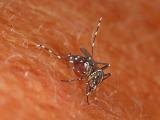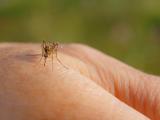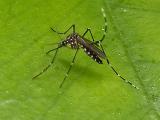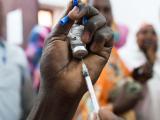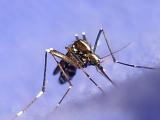May 11, 2005 (CIDRAP News) An initial human trial of a West Nile virus (WNV) vaccine has yielded promising results, officials said today.
In the double-blind, randomized trial, all but one of the people who received the vaccine developed antibodies to it, according to an Associated Press (AP) report quoting Dr. Thomas Monath, chief scientist at Acambis, the company that created the vaccine.
Results of the trial were to be presented today at the National Foundation for Infectious Disease's (NFID) annual conference in Baltimore, 5 years after the company began researching WNV vaccines. Acambis had received a $3 million grant from the National Institutes of Health. Testing on volunteers began in 2003, the AP reported.
Acambis created the ChimeriVax-West Nile vaccine by combining some genes from WNV with a licensed yellow fever vaccine, the AP story said. The yellow fever virus is a relative of the West Nile virus, and the yellow fever vaccine is known to be safe.
The phase 1 clinical trial involved 80 volunteers. Thirty people received a single high dose of the vaccine, 15 were given a low dose, 30 received a placebo, and 5 received a yellow fever vaccine, Acambis officials said in a news release.
By 28 days after vaccination, 96% of the high-dose group and 100% of the low-dose group had a measurable antibody response, Acambis reported. The company reported mean antibody titers of 1280 and 1350, considered high, in the respective groups.
The rate of vaccination side effects varied relatively little among the high-dose group (40%), the low-dose group (46.7%), and the placebo groups (43.3%), Acambis announced. No serious adverse events were blamed on the vaccine.
"We are encouraged by the immune response generated by trial subjects who were vaccinated with a single inoculation," Monath said in the news release.
The next phase of testing will include a larger sample with more older adults, the AP reported. Provided the second phase goes well, the third phase will involve thousands of people.
Dr. Anthony Fauci, director of the National Institute of Allergy and Infectious Diseases, said he was impressed by the percentage of patients who showed high levels of antibodies, but he cautioned that these are early findings, the AP reported.
Use of the proven yellow fever vaccine to create a safe hybrid could shave years off vaccine development, Fauci added.
No vaccine has been approved for West Nile, which first appeared in the United States in New York in 1999 and has spread to every contiguous state except Washington since then. WNV caused at least 2,470 illnesses and 89 deaths in the United States last year, according to the Centers for Disease Control and Prevention (CDC).
Most people who contract the virus are don't become ill, but about 20% can experience fever, headache, nausea, and vomiting. About 1 in 150 suffers a severe illness, according to the CDC.
